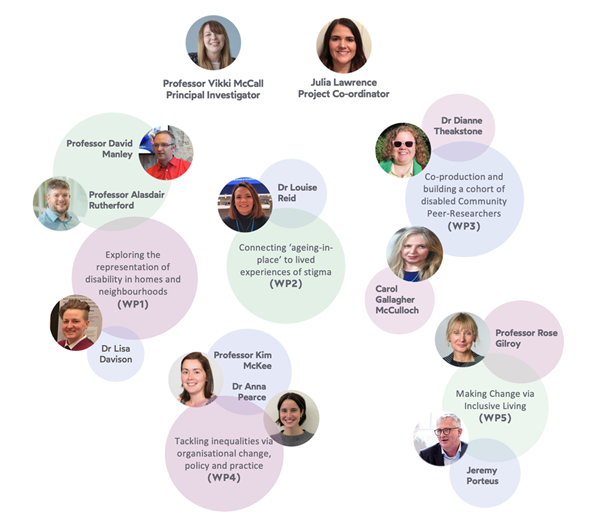The ISPA project Team

Partnered with the Housing LIN and Scottish Federation of Housing Associations (SFHA), the Intersectional Stigma of Place-Based Ageing (ISPA) Project is a collaboration between the University of Stirling and the University of St Andrews, Newcastle University and University of Bristol.
Principal Investigator leading the project, with special focus on the co-production and building a UK-wide group of Community Peer-Researchers and the Inclusive Living Alliance. Professor Vikki McCall is a Senior Lecturer in Social Policy & Housing in the Faculty of Social Sciences, University of Stirling. Professor McCall is Principal Investigator on the Intersectional Stigma of Place-based Ageing (ISPA) project and has worked in partnership with the Scottish Federation of Housing Associations (SFHA) and Housing LIN and other key housing sector partners developing the concept of Inclusive Living, and related toolkit that supports a more inclusive approach to housing support being developed on ISPA. Vikki was part of the team that won the Sociological Review Prize for Outstanding Scholarship (2017) for work on tackling urban stigmatisation in disadvantaged communities and is an expert in co-production. Vikki is Honorary Secretary for the Social Policy Association Executive Committee and Editorial Board member of the Social Policy & Society journal. Twitter: @vikki_mccall & @HousingStirUni Co-investigator leading the project work focused on connecting ‘ageing-in-place’ to lived experiences of stigma and the ISPA early career network. Dr Louise Reid is a Senior Lecturer in the School of Geography & Sustainable Development at the University of St Andrews. Dr Reid is a social scientist working in the area of sustainable practices with a particular interest in the processes through which these influence and are influenced by everyday household life. Increasingly, her focus explores the role of digital and smart technologies within these relations. For instance, Dr Reid has led projects on Low Carbon Smart Homes (ESRC Future Research Leaders Project) and ‘Homes that Care’ (RSE Fellowship). Dr Reid is member of the Young Academy of Scotland (Royal Society of Edinburgh), vice-chair of the Board of Hanover Housing Scotland, and sits on the Editorial Board of Transactions of the Institute of British Geographers. Twitter: @louannereid Co-investigator leading the project work focused on tackling inequalities via organisational change, policy and practice and developing the new Inclusive Living Toolkit. Professor Kim McKee is a Professor of Housing & Social Policy in the Faculty of Social Sciences at the University of Stirling. Her qualitative research is centred around housing inequalities, place and the emotions of housing. She has been supported by a wide range of funders including the ESRC, the British Academy, the Leverhulme Trust and a variety of public, voluntary and charitable sector organisations. Kim is currently a member of the international editorial advisory board of the journal Housing Studies and is a former Chair of the Housing Studies Association. X: @ISPAProject Co-investigator leading the project work focused on making change in the housing, health and social care sector via Inclusive Living and building the Inclusive Living Alliance. Rose Gilroy is Professor of Ageing, Planning and Policy in the School of Architecture, Planning and Landscape, Newcastle University, UK. Her work focuses on the transactional relationship between older people and their place that embraces how people individually and collectively may influence their environments. Her latest book “Planning for an Ageing Society” was published by Lund Humphries in February 2021. Rose is committed to change and much of her work is action oriented. She is Chair of Newcastle Age Friendly City and the founder of the Future Homes Alliance that will be building multi-generational housing in the centre of Newcastle. Twitter: @profroseg & @FutureHomesAll Co-investigator leading on the inclusive technology supporting the academic team and project participants alongside the statistical analysis around disability and ageing in homes and neighbourhoods. Alasdair Rutherford is a Professor of Social Statistics at the University of Stirling. His research focus is the analysis of administrative and survey data in the fields of health, social care and the third sector. He has also been involved in a number of initiatives to build data analysis skills amongst third sector practitioners. Alasdair's academic background includes economics, sociology, psychology and artificial intelligence. Prior to becoming an academic, Alasdair worked for seven years in marketing and fundraising for a large social care charity. Alasdair is part of the Centre for Population Change; the Scottish Civil Society Data Partnership; and the Scottish Longitudinal Study of Ageing (HAGIS). He was also involved in the Scottish Administrative Data Research Centre. Alasdair sits on the Scottish Third Sector Research Forum and the NCVO Research Advisory Group. He is a board member of the Stirling Carers Centre. Twitter: @AltEcon Co-investigator leading the project work focused on exploring the representation of disability in homes and neighbourhoods. David is the Head of the School of Geographical Sciences, University of Bristol. He is interested in trying to better understand how the places in which individuals live interact with the outcomes that they experience over their life course. Key topics within this research include modelling and understanding neighbourhood effects, investigating how individuals and households locate in residential space and understanding how segregation develops and is maintained over (very) long periods of time. Crucial to this work is the notion that statistics can be used critically to challenge ‘myths’ in the academic literature. David is also interested in more methodological problems including how neighbourhoods are represented and different scales and in different places. He is on the editorial board of Housing Studies, and editor for Progress in Human Geography and on the advisor board for Understanding Society. Twitter: @david_j_manley Dr Dianne Theakstone is the full time Research Fellow supporting all the work on the ISPA Project but with special focus on the co-production and building a UK-wide group of Community Peer-Researchers that includes a diverse range of disabled adults to ensure lived experience is at the heart of the ISPA project. Dr Dianne-Dominique Theakstone is a research fellow on the ‘Intersectional Stigma and Place-based Aging’ (ISPA) project. She is based at the University of Stirling in the department of Social Sciences. Dianne qualified as a social worker in 2022, before which her background in social care and housing research focused upon co-production methods involving disabled people. For example, her work on ‘My Support My Choice: People’s Experiences of Self-directed Support and Social Care in Scotland’ (2020) helped inform the development of new social work practice standards by Social Work Scotland around self-directed support. Dianne’s lived experience of disablement drives her passion for enabling others to access independent living, particularly through her role as trustee with Sight Scotland and Sight Scotland Veterans, as well as Horizon Housing. Twitter: @HousingStirUni Research Assistant, PhD Candidate and Personal Assistant to Dr Dianne Theakstone Carol is Research Assistant and PhD Candidate within the Division of Sociology, Social Policy & Criminology, Faculty of Social Sciences. Carol has expertise in housing, reflection, education and also criminology and is Personal Assistant to Dr Dianne Theakstone. Twitter: @HousingStirUni Co-investigator supporting the dissemination of project outputs alongside the Inclusive Living Alliance. Jeremy is CEO of the Housing Learning and Improvement Network (LIN), a sophisticated network bringing together housing, health and social care professionals in England, Wales, and Scotland to exemplify innovative housing solutions for an ageing population. Jeremy is also part of the ESRC funded Designing Homes for Healthy Cognitive Ageing (DesHCA), ESRC funding Improving Adult Care Together (IMPACT) Projects. He has also commissioned and published practice papers on inclusive housing and community-led approaches to housing for all ages, coined by the Housing LIN as ‘CollaborAGE’ and hosts a knowledge exchange platform with latest policy, research and practice developments on inclusive living on the Housing LIN ‘design hub’. Jeremy sits on the government’s UKRI Advisory Group on Healthy Ageing Challenge and was a member of MHCLG’s Home of 2030 design competition, which includes looking at new approaches to inclusive homes and communities for all ages. Twitter: @HousingLIN Co-investigator supporting the Inclusive Living toolkit development, dissemination and Inclusive Living Alliance. Debs is Member Solutions Manager at the Sottish Federation of Housing Associations (SFHA) and has over 15 years within the community sector, more recently within housing, with an emphasis on cross-sector innovative and collaborative solutions, service design, development and operational delivery. She has diverse knowledge base alongside specialist expertise in community engagement, tenancy sustainment and performance management that supports the strategic development of sustainable quality services and positive customer experience. Debs focuses on innovative new processes or ways of working whilst remaining sensitive to the dynamics of groups, individuals, legislative and regulatory requirements. Twitter: @InnovationSfha Julia Lawrence is the project co-ordinator on the Intersectional Stigma of Place-based Ageing (ISPA) project. Julia’s previous research activities include housing and disability; inequality and social exclusion; and user experiences of e-health and smart home technologies to support independent living. She recognises the importance of developing good practice in co-production and has supported and collaborated with a range of service users including older and disabled people, as well as housing, health and social care practitioners on a number of projects. Julia also has previously supported the needs of disabled people working as Peer Researchers and facilitated Project Advisory Boards. Twitter: @JuliaLawrence77 Dr Lisa Davison is the quantitative research fellow on the Intersectional Stigma of Place-based Ageing (ISPA) project. Dr Lisa Davison is a research fellow on the ‘Intersectional Stigma and Place-based Ageing’ (ISPA) project, based in the department of Social Sciences at the University of Stirling. Lisa’s background is in Gerontology, they completed their PhD in August 2021 at the University of Southampton. Alongside ISPA, they currently work as a quantitative research fellow on the Designing Homes for Healthy Cognitive Ageing (DesHCA) project, which focuses exploring a variety of data sources, to analyse the risk profile of individuals in relation to future home adaptations and understanding how those adaptations impact health and wellbeing. Their previous research has focused on the relationships between caregiving, loneliness, health, and wellbeing using English data, and between migration and pensions using a range of European data. Twitter: @LisaDavisonPhD Anna is a Research Associate on the ISPA Project. She has just completed her Ph.D. in Geography, School of Geography & Sustainable Development, University of St Andrews.Meet the Team

Professor Vikki McCall, University of Stirling

Dr Louise Reid, University of St Andrews

Professor Kim McKee, University of Stirling

Professor Rose Gilroy, Newcastle University

Professor Alasdair Rutherford, University of Stirling

Professor David Manley, University of Bristol

Dr Dianne Theakstone, University of Stirling

Carol Gallagher McCulloch, University of Stirling

Jeremy Porteus, Housing Learning and Improvement Network

Debs Allan, Scottish Federation of Housing Associations

Julia Lawrence, University of Stirling

Dr Lisa Davison, University of Stirling

Anna Pearce, University of Stirling
Contact Details
 Dr Vikki McCall, University of Stirling
Dr Vikki McCall, University of Stirling
 Dr Dianne Theakstone, University of Stirling
Dr Dianne Theakstone, University of Stirling
Acknowledgements
 The Intersectional Stigma of Place-Based Ageing (ISPA) Project is funded by the Economic and Social Research Council and runs from September 2022 to September 2027.
The Intersectional Stigma of Place-Based Ageing (ISPA) Project is funded by the Economic and Social Research Council and runs from September 2022 to September 2027.
The project is a collaboration between the University of Stirling and the University of St Andrews, Newcastle University and University of Bristol. We are also partnered with the Housing Learning and Improvement Network (Housing LIN) and Scottish Federation of Housing Associations (SFHA).






